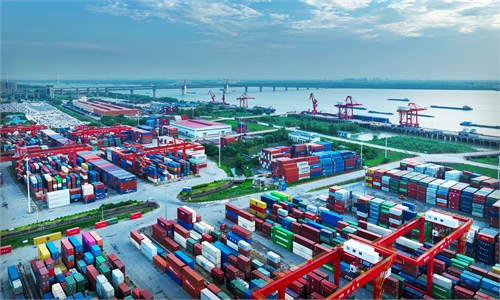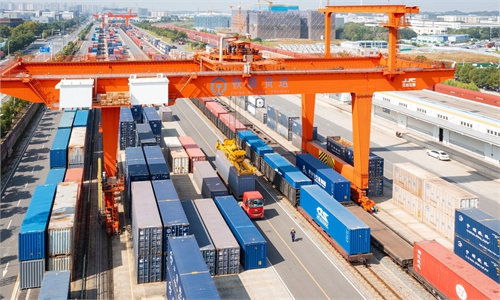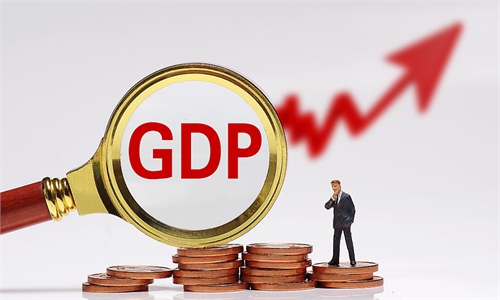
Bustling scenes on Nanjing Road, East China's Shanghai Municipality on September 14, 2023 Photo: VCG
China's GDP expanded 4.9 percent year-on-year in the third quarter, data from the National Bureau of Statistics (NBS) showed on Wednesday. The economy grew by 5.2 percent in the first three quarters.Apparently, China's third-quarter GDP growth was much better than the expectations of economists and institutions surveyed by Western media outlets. A Reuters poll of economists showed a consensus of 4.4 percent growth for the July-September period.
Given the complex and grave external environment and some domestic challenges, there have been lots of Western media reports in recent months badmouthing China's economic prospects. While pessimistic sentiment toward China's economic momentum appeared to be waning in recent weeks, probably due to signs of further stabilization, Western smearing of the Chinese economy hasn't entirely disappeared. For instance, as recently as last week, the Wall Street Journal claimed that the Chinese economy remains on "shaky footing."
Yet, the fact that China is well on track to achieve its annual growth target is the best response to the West's underestimation of China's ability to respond to its economic challenges.
With the 5.2 percent growth rate establishing a solid foundation, Sheng Laiyun, deputy director of the NBS, said that as long as GDP growth reaches 4.4 percent or above in the fourth quarter, China will achieve its annual GDP growth target of around 5 percent for 2023.
There is no denying that this year, due to various uncertainties including geopolitics, a global economic slowdown and domestic challenges, the Chinese economy has been facing considerable downward pressure. Against this backdrop, it is completely normal to see volatility in some major economic indicators, but this doesn't mean a change in China's economic resilience, growth potential and long-term fundamentals.
For instance, relatively low inflation has stoked concerns that China may experience a Japan-style economic stagnation. But China's short-term inflation fluctuations aren't the same thing as Japan's long-term deflation.
In the 1990s, the per capita GDP of Japan reached around $30,000, with its economic growth slowing significantly. Lackluster economic growth and insufficient market demand were the fundamental reasons for Japan's deflation. By comparison, China remains a developing country with per capita GDP of about $12,000, and it still has huge potential for economic growth. Despite the current pressure, its economic growth is still expected to be much faster than that of most countries this year. Last week, the IMF released its latest World Economic Outlook, which retained a global growth forecast of 3 percent for 2023.
The resilience of the Chinese economy is not only due to its fundamentals. It also stems from the policymakers' ability to issue targeted measures to bolster growth amid challenges. Measures designed to stabilize the economy have already had an effect, and some economic indicators have even shown an improvement. For instance, the downward trend of prices has halted. China's consumer price index, the main gauge of inflation, was flat in September on a yearly basis, but it rose 0.2 percent compared with the previous month as consumption continued to recover.
For the Chinese economy, the pessimists are never short of reasons to be pessimistic, and the optimists can always find evidence to be optimistic. This is why economists and institutions need patience, not short-term data, to assess and judge the trends of China's economy comprehensively and accurately. China's economy has generally been on the upswing over the past 40 years, accompanied by the sound of pessimistic voices, which proves that China always has the ability to adjust and get through difficulties after temporary hiccups.
Last but not least, the Chinese economy cannot be separated from cooperation with other countries. China will unswervingly continue to open up its market to create one of the best business environments in the world. This is also one of the key ways China will respond to external challenges. With China's economic momentum strengthening, there is every reason to believe that the Chinese economy will continue to make a greater contribution to the world's economic recovery.



